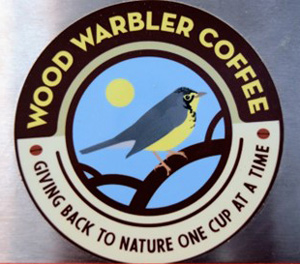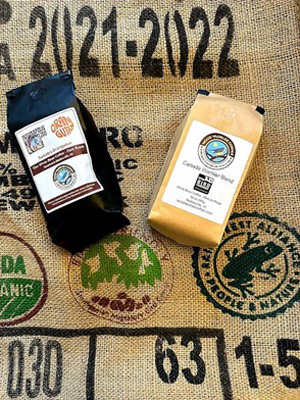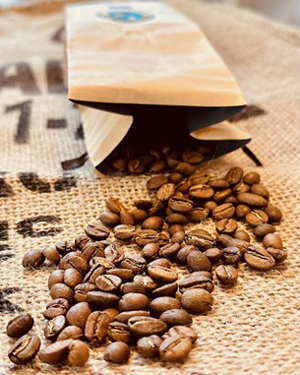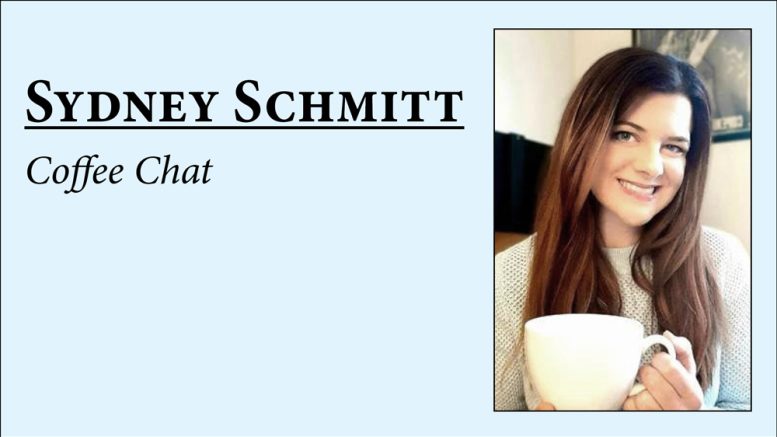Wood Warbler Coffee, 1108 S. 8th St., Noblesville, is a coffee roastery worth chirping about.
That’s because owner Jeff Canada definitely knows a thing or two about roasting coffee … bird-friendly coffee.

Graphic provided
After listening to a radio show about roasting coffee beans in 2017, Jeff, an avid coffee drinker, decided to start his own coffee roastery – one with the purpose to raise awareness about how harmful coffee harvesting can be to the environment while also raising funds for habitat conservation. He learned more about bird-friendly coffee and became a certified bird-friendly coffee roaster through the Smithsonian Institute. Now, the Smithsonian bird-friendly seal is proudly stamped on the bags of roasted coffee beans he sells.
Wanting to learn more about what it means to be a bird-friendly coffee roaster, I sought answers through the Smithsonian Institute website and through Jeff.
According to the Smithsonian, nearly three-quarters of the world’s coffee production harms forest habitats. Bird-friendly coffee farms are forests that aim to be a bird-friendly habitat by letting the trees grow instead of cutting the forests down into bushes for coffee harvesting. In order to be a bird-friendly coffee farmer, the farmer must reach the criteria the Smithsonian Institute created to be able to call themselves bird-friendly. This means that when you buy Wood Warbler Coffee and other bird-friendly coffee, the coffee you will be drinking is shade-grown and not sun-grown, which can influence the taste of your coffee.

Photo provided
Some coffee connoisseurs say that shade-grown coffee tastes better than sun-grown coffee because of the different types of trees that provide shade to the coffee trees and that the shade-grown beans mature at a slower rate than sun grown-coffee beans, which can make shade-grown coffee develop more natural sugars that impact flavor … but I’ll let you be the judge of that coffee taste test.
When purchasing bird-friendly coffee, you’re also guaranteed that it is organic and pesticide-free, so let your taste buds sing in those praises when you take the first sip of your morning delight.
Why the name Wood Warbler Coffee though? The answer is simple: Jeff’s favorite Warbler is the Canada Warbler. The name Wood Warbler Coffee reflects the bird that is extremely popular, well-loved, and one of the primary birds of focus for the bird-friendly certification, as it is one of many birds that migrates to the bird-friendly forests during the winter season.
I was enlightened to hear the story about how every year, fans of the Warbler bird and other songbirds travel to Magee Marsh, on the Southern shore of Lake Erie, to witness the magical migration of several different types of birds. Jeff’s logo for Wood Warbler Coffee is from a photograph he snapped himself of the Warbler, which adds a unique and caring touch to the bird-friendly coffee he roasts.

Photo provided
Jeff brewed a cup of bird-friendly and freshly roasted Nicaraguan coffee for me. It was smooth and had a hint of a fruity flavor. His “Bird Song” blend is one of the most popular blends. It has a mild acidity and a clean smooth finish, with hints of chocolate, brown sugar, almond, caramel, and a zap of orange. He roasts his shade-grown coffee in small batches, which leads to excellent quality in taste.
When you buy coffee from Wood Warbler Coffee, you can feel better knowing that your cup of coffee helps preserve habitats for birds and wildlife, protects against climate change and biodiversity, and supports farmers that are fighting to conserve bird and wildlife habitats.
To learn more about bird-friendly coffee, visit nationalzoo.si.edu/migratory-birds/about-bird-friendly-coffee, and to purchase bird-friendly coffee and learn more about Wood Warbler Coffee, check out WoodWarblerCoffee.com.

